山水画画家徐龙森
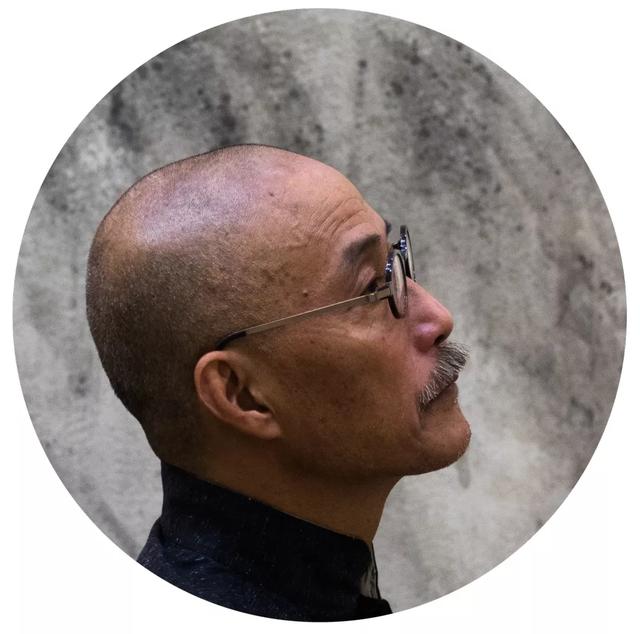
徐龙森,山水画画家,1956年生于中国上海
个人简介 / Profile
徐龙森,山水画画家。1956年生于中国上海,1976年毕业于上海工艺美术学校。他的作品以宏大的尺度和精微的笔墨著称,复兴了山水画的重要品质 — 雄浑恣肆、磊落旷达。1984年,他以石雕作品《遥远》参加第六届全国美术作品展览、2002年11月参展第一届“高山流水”展。此外多次到国外开画展。自2009年起,先后在比利时布鲁塞尔、法国巴黎、英国伦敦、意大利罗马、新加坡等地举办个展。
Xu Longsen is a landscape painter. He was born in Shanghai in 1956 and graduated from Shanghai Arts & Crafts College in 1976. His works are known for their grand scale and subtle strokes, which revives the important qualities of landscape painting -- vigorous, unbridled and broad-minded. In 1984, he participated in the 6th National Fine Arts Exhibition with his stone sculpture "Distance" and the 1st "High Mountain and Flowing Water" Exhibition in November 2002. In addition, he has held many exhibitions abroad. Since 2009, solo exhibitions have been held in Brussels, Paris, London, Rome, Singapore and other places.
在古老的神话中,宇宙混沌一片,沉睡了万年的巨人盘古突然醒来,一斧劈开了眼前的黑暗。他的呼吸成了云雾,血液变作河流,躯体化为大地与山川。从此人间诞生了山水与万物。千年之前,“山水”又化为了东方文化的载体,成为了中国艺术传统的重要文脉,散发出独特迷人的精神气韵。
In ancient mythology, the universe was chaotic and the giant Pan Gu, who had been sleeping for thousands of years, suddenly awakened and cleaved the darkness in front of his eyes. His breath became mist, his blood became rivers, his body became earth and mountains. Since then, the world was born of mountains and rivers and all things. Thousands of years ago, "landscape" has become the carrier of oriental culture, an important context of Chinese art tradition, and exudes a unique and charming spirit.
在今天,仍有人醉心于山水,徐龙森则近乎于痴与迷,他在笔墨之间构建新的宇宙观与世界观,将山水以更开放的姿态呈现于世界。
Today, some people are still fascinated by mountains and rivers, while Xu Longsen is crazy about them. He builds a new world with his brush and ink, presenting these landscapes to the world.
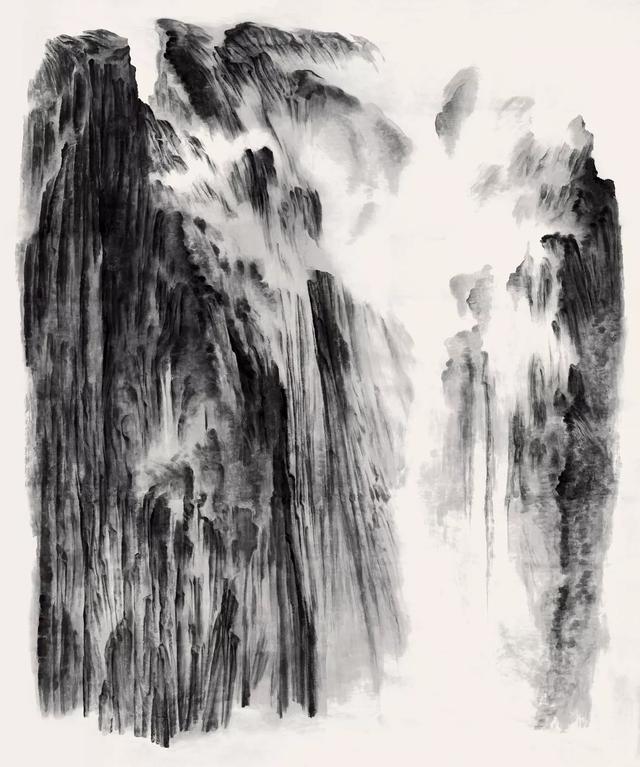
《山不厌高之一》
千年之后,山水无恙。
The landscape stays even after a thousand years.
峰回路转处
The Bend in the Road
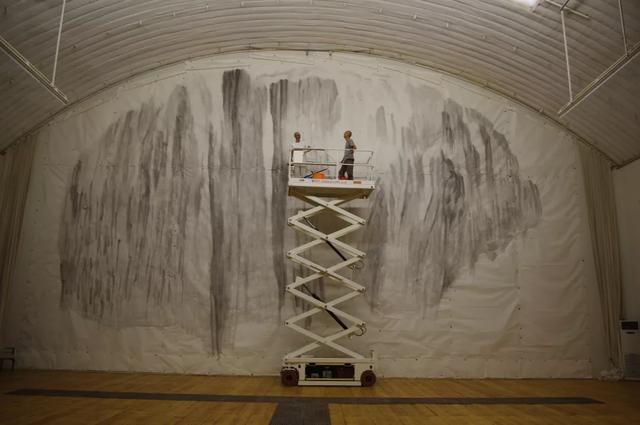
任何人来到徐龙森的画室,都会有一种空间错位的感觉:巨大的穹庐状的工作室被刷成全白,又染上了多年来创作过程中留下的墨痕,仿佛这是间宣纸做成的屋子。
Anyone who comes to Xu Longsen's studio would immediately experience a sense of spatial dislocation: the huge vaulted studio is painted all white and stained only with ink left by years of creation, as if it were a room made of Xuan paper.
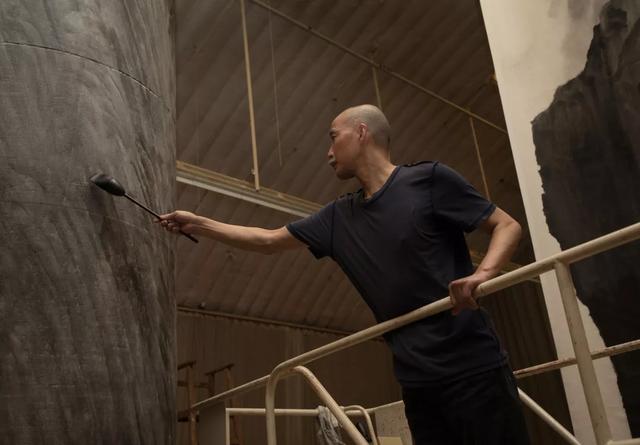
高达七、八米的巨幅山水画作挂满四壁,抬眼望去,全是望不到边际的山峦,恍惚间,你会忘了今夕何夕。峰峦叠嶂、深谷浅川,画幅之间,每座山的目光都很重。
As high as up to seven or eight meters of huge landscape paintings hung all over the walls. Looking up at these endless mountains, peaks, valleys and shallow rivers will leave you in a trance.
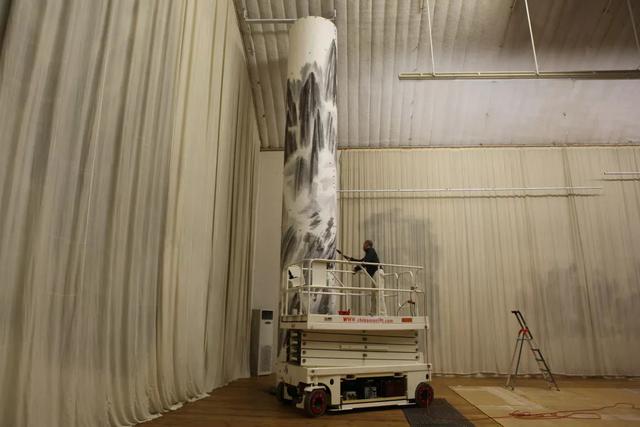
采访是在午后进行的,徐龙森刚刚结束午间的休息。画大画的过程是非常艰辛的,需要反复走近、退后,通过升降车攀上爬下,以描绘细节和观察全貌。刚走进工作室,徐龙森便搬了张椅子坐在画室正中间,凝视观察着前方的画作,那是他目前在处于创作阶段的一副画。眼前的徐龙森,面容清癯,目光专注,像是端坐在山间。
The interview was conducted in the afternoon, right after Xu Longsen’s lunch break. The process of painting a large work is tedious as it requires the artist to repeatedly move around in order to observe the whole picture. Upon entering the studio, Xu Longsen moved a chair to the center of the studio and sat down to observe the painting he is currently working on. Xu Longsen has a thin face, eyes filled with concentration, as if he is sitting in the mountains.
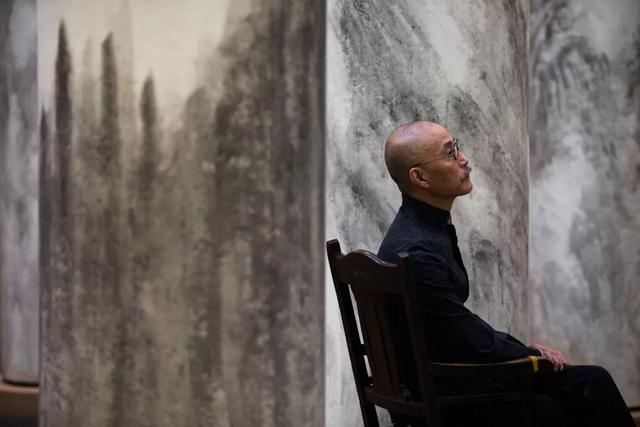
这份严肃与距离感,在谈话过程中一点点地消减。创作状态之外的徐龙森,笑起来眼睛眯起来,讲述起自己与山水的相遇:1976年,他从上海工艺美术学院黄杨木雕刻专业毕业后,进行了六年的玉石雕刻工作,通过这些工艺,令他对中国民间艺术语言的表述方式有了清晰的脉络梳理。“民间艺术的优点是传神,不太在意结构的精准,但恰恰是这个缺点,对我之后的创作意义重大。”
This sense of distance receded little by little during the conversation. Xu Longsen smiles as he talks about his first encounters with landscape. In 1976, he graduated from Shanghai Arts & Crafts College with a carving major. Through his six years of jade carving experience, he is able to gain a clear understanding of Chinese traditional art. “The advantage of folk-art is its expressiveness, but the disadvantage is that it does not pay attention to structural accuracy, which is of great significance for my later creations.”
青年时代的他还有一个最大的爱好 — 泡博物馆。从1977年开始,他几乎每个周末都要跑去上海博物馆,一直泡到“它从河南路迁到人民广场”,在那里,他接触并爱上了中国山水画,从此一发不可收拾。然而之后,徐龙森摇身一变,成了艺术经纪人,创立了上海茂名路上风光一时的东海堂。
In his youth, his favorite hobby was visiting museums. Since 1977, he visited Shanghai museum almost every weekend until "it moved from Henan Road to the People's Square", where he came into contact with and fell in love with Chinese landscape painting. Later, Xu Longsen transformed himself into an art agent and founded the DongHai Gallery on Maoming Road in Shanghai.
十几年的画廊生涯使他对中西方文化的理解更加丰满,2004年,徐龙森用很短时间结束了他在上海的画廊生意,来到了北京专心作画。谈到选择北京的理由,他说:“向往北方的辽阔和天高云淡”。
After more than a decade at the gallery, which enriched his understanding of Chinese and western culture, Xu Longsen cut short his gallery business in Shanghai in 2004 and moved to Beijing to concentrate on painting. Speaking of his reasons for choosing Beijing, he said: "I yearn for the vast expanse of the north and the clear sky."
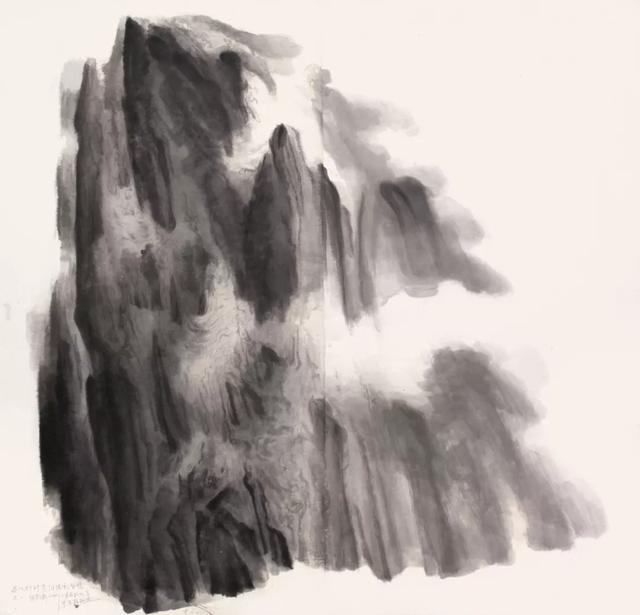
《造化钟神秀,阴阳割春晓》
命运峰回路转,49岁的徐龙森,找到了可以寄情的那方山水。
At the age of 49, Xu Longsen has found his perfect retreat.
一拳打破古来今
A Punch Breaks the Bound
Between Past and Present
从《诗经》中的“高山仰止”到孔子的“智者乐水、仁者乐山”,再到曹操的“山不厌高、海不厌深”。世界在中国人的精神维度内是无边无界的天地悠悠。徐龙森最爱的三幅山水画作是郭熙的《早春图》、范宽的《溪山行旅图》与李唐的《万壑松风图》,这三幅山水在徐龙森看来有极为珍贵的精神气质,是山水世界中“孤峰”般的存在。
From "The High Mountains" in The Book of Songs to Confucius’s "The Wise Find Pleasure in Water; the Virtuous Find Pleasure in Hills", to Cao Cao’s "Mountains never satisfied with its height, seas never satisfied with its depth". The world is boundless in Chinese traditional culture and philosophy. Xu Longsen's three favourite landscape paintings are Guo Xi's Early Spring, Fan Kuan's Travel Picture of the River and Mountain, and Li Tang's Wangai Pine Wind Picture. These three landscape paintings are extremely precious in to Xu Longsen's as he believes they are the only "lonely peaks" in the landscape world.
山水作为东方文明对人与宇宙的畅神怀想,天人合一的精神诉求,在今天仍不失其生命力。然而传统山水画在几经流转之后,却黯然了很多,用徐龙森的话来说,是“只剩下固化的口诀和图式、工艺流程式的技法。”
Landscape, still holds the ideals of eastern civilization even till this day. However, traditional landscape painting has lost much of its glory through the years, and is now only left with formulaic processing techniques.
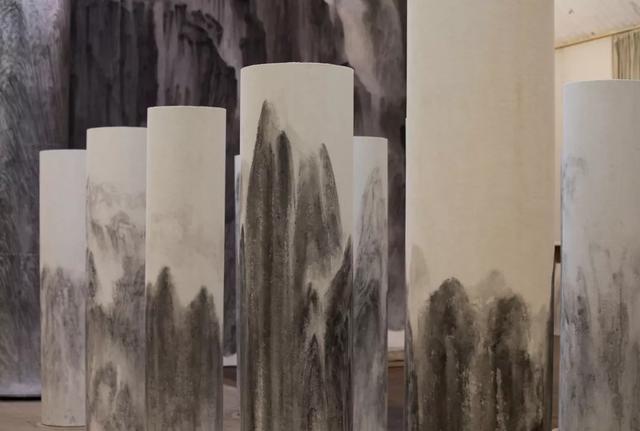
“一拳打破古来今”,这是艺术大师吴昌硕的一句诗,也是徐龙森的创作态度。选择了山水的他,决定用新的艺术语言打破这一局面,摆脱笔墨的束缚。在他看来,山水是一门世界观的艺术,以天、地、人为核心,是个人和宇宙共振的孤明独照,是个体精神的天问,是个体的精神信仰。
"One punch breaks the past and the present", is a poem written by artist Wu Changshuo, and has always been Xu Longsen's long held creative attitude. He is determined to use a brand new artistic language to break loose from the shackles of ink and create an entirely unique landscape art. To him, landscape is an art form that encompasses worldwide views with heaven, earth and people as the core, it becomes a spiritual faith.
在徐龙森的山水视界,绝然看不到任何具象之物,你休想找到片叶的烟火气。群山由层层积染而成,近看混沌一片,远观厚重静穆。在徐龙森的作品中,山水逃离了笔墨的牢笼,变成更加开放的气韵,它们流动如烟、氤氲似水,汇聚积累着更多的力量,等待着在时间空间中迸发。
In Xu Longsen's landscape works, you will never find any concrete forms. His mountains are made up of layers of mud, thick and quiet at from a distance. In Xu Longsen's works, mountains and rivers flow and escape from his brush and ink, gathering and accumulating power, awaiting to burst out in time and space.
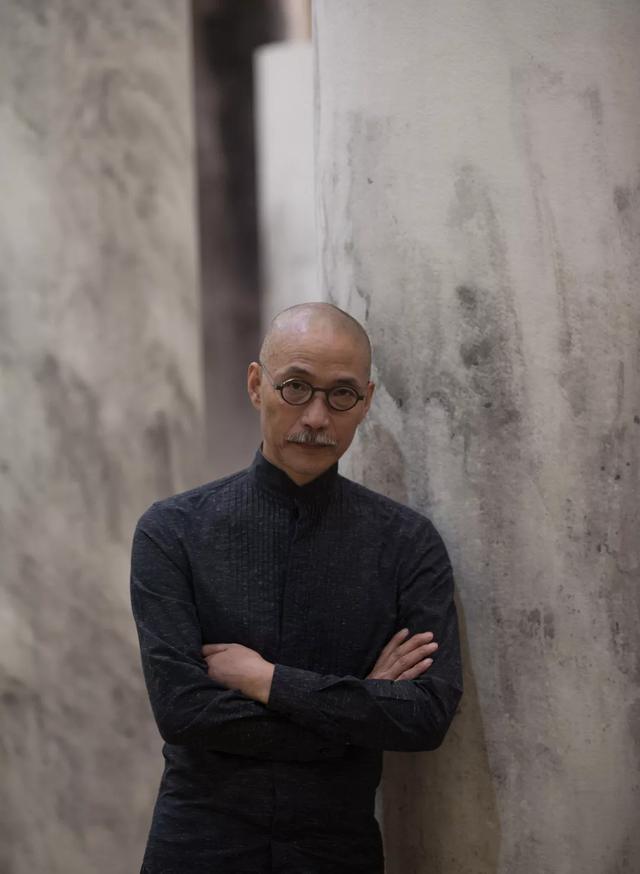
谈到为什么选择画大画,徐龙森自嘲道:“或许是性格好大喜功吧”,他还讲到在大都会博物馆看到中国壁画以及在当代MOMA看到罗斯科壁画时的震惊,“我决定画出震撼人的东西,至于观者怎么看,就交给天意吧”。说到这儿时,他又笑眯了眼。
As to why he chose to paint large paintings, he said, "maybe it's because I’m a man of great character." He also talked about his shock at seeing Chinese frescos at the Metropolitan Museum and seeing Mark Rothko’s frescos at MOMA. He smiled again.
“公共空间的时代到了”
"The Time for Public Spaces Has Come."
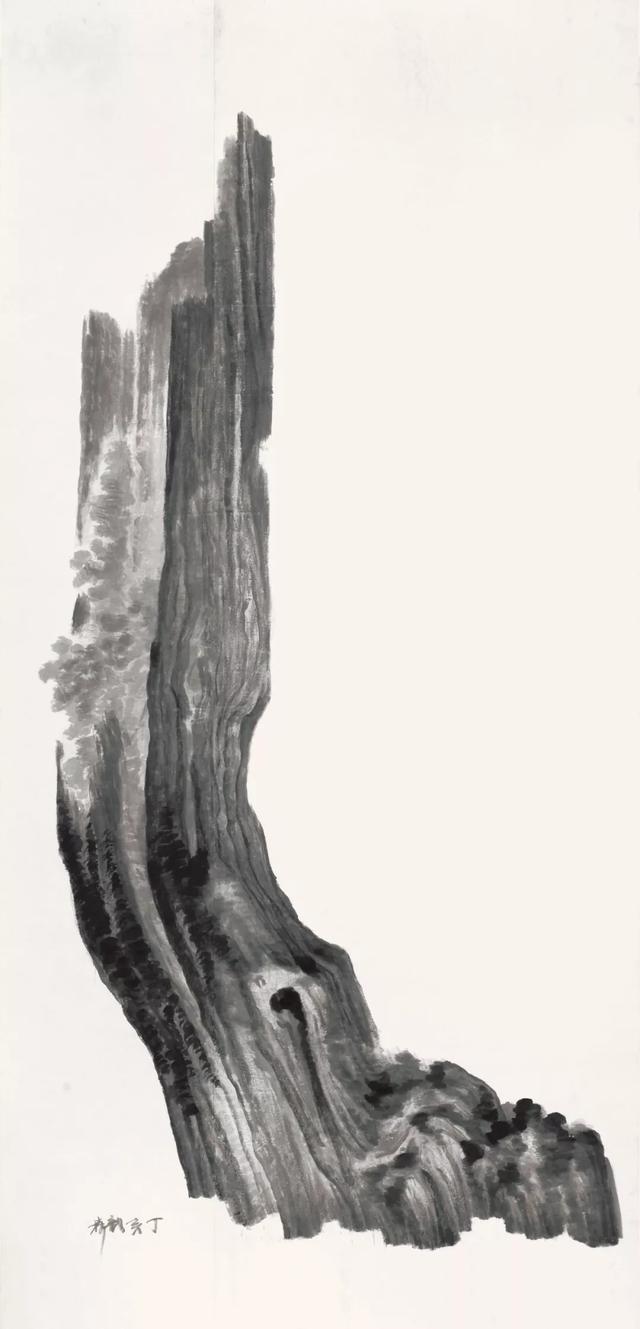
《柏树》
大幅画作,也是徐龙森对于现代公共空间的一种探索,“现在,我们已经完全进入一个公共空间的时代。在这个时候,如果我们不能对应它,就无法驾驭它。美术馆的时代到了,博物馆时代到了,公共时代到了,我们应该思考如何去应对。”
Large paintings also Xu Longsen's way of exploring a modern and public space. “Now, we have completely entered an era of public space. If we can't correspond to it, we can't manage it. The time has come for galleries, the time has come for Museums, the time has come for the Public, and we should think about how to respond.
面对公共空间,徐龙森交出了自己的答案:他以大尺幅山水画的体量、构图、留白、格局及雄浑、冲淡的意境,消解了空间带来的紧张感和压迫感,打造出一个无限深远的“山水剧场”。
Xu Longsen gave his own answer: he created an infinite and far-reaching "landscape theatre" by eliminating composition, and patterns to relieve tension and sense of oppression brought by space.
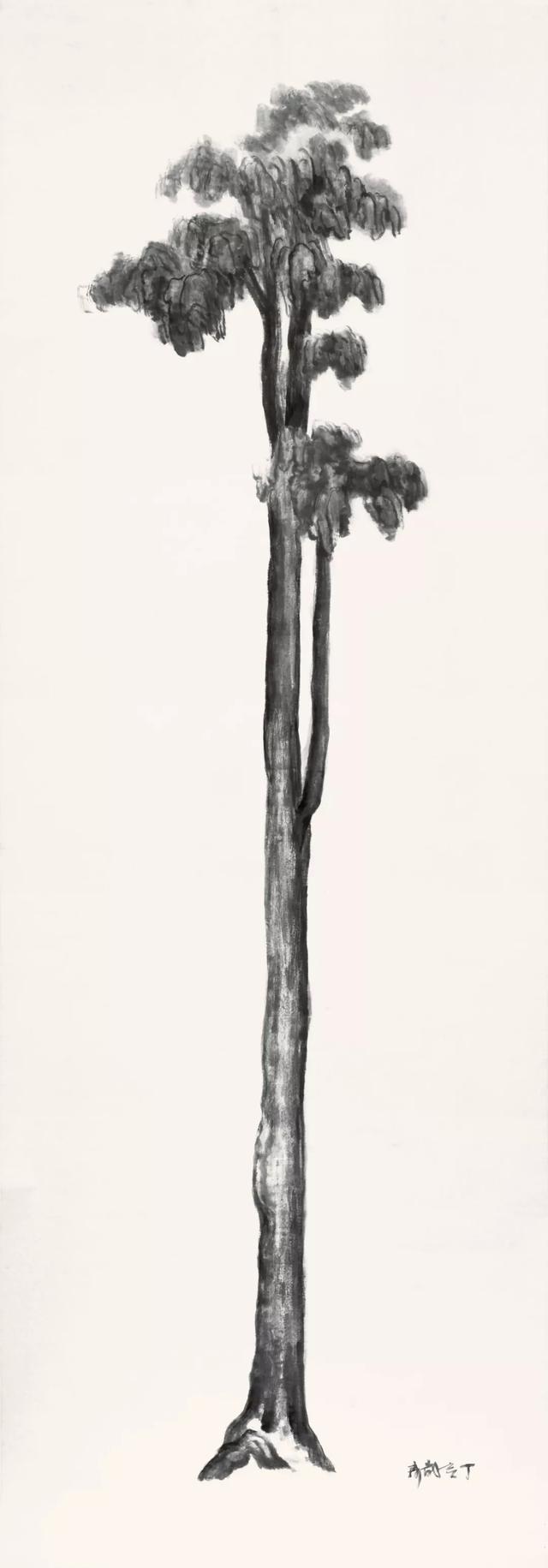
《梧桐树》
当每个人置身于这山水之中时,都会被带进这无人之境,抬头仰视山水,低头关照内心。
When anyone is placed in this landscape, they will be brought into a serene space, that allows for looking up at the landscape while reflecting with their hearts.
徐龙森曾多次到过侨福芳草地,初次来到这儿时,他觉得这里很是有趣。侨福当代美术馆、达利艺术收藏品最多的地方、精致的怡亨酒店、有个性的商场、高级写字楼及多元化的餐饮空间等......种种事与物巧妙地在一个空间内碰撞存在着,“一切完美的融合”。侨福芳草完全不私藏艺术收藏品,与大众所分享,徐龙森很认同“艺术是公共的”这一观点。对于艺术家个人而言,一件作品在工作室被完成,与在公共空间呈现的意义是不一样的,场所的变化会让艺术家的眼睛更加敏锐,更能审视自己的作品。
Xu Longsen has been to Parkview Green FangCaoDi many times, he thought it was a very interesting place on his first visit. Parkview Green FangCaoDi is a space where everything collides together – The Parkview Museum, a place with the largest Dali collection, Hotel Éclat Beijing, personalized shopping malls, advanced office buildings and a variety of dining space. Parkview Green FangCaoDi does not hide any art collections but shares them with the public. Xu Longsen agrees that “art is public”. For the artist personally, the meaning of a work completed in the studio is different from presenting it in the public space. The change of the space will allow for the artist's eyes to become more acute examine his own works from another perspective.
侨福芳草地作为商业与艺术完美融合的实验产物,代表着艺术对于空间的另一种诠释。被体验与被观看着的侨福芳草地,同时也承担着公共教育的意义,徐龙森说:“大众只有在拥有一定的阅读量后,才能更好去理解艺术”。
Parkview Green FangCaoDi, is the perfect integration of commerce and art. While it is admired, it also bears the significance of public education. Xu Longsen said, “Only after the public has a certain amount of contact with art can they better understand art.”
采访的尾声,有这样一个问题:请用一个词来形容现在的生活状态。
Near the end of the interview, a question came up: please use one word to describe the current state of life.
徐龙森沉默地思考了片刻,用了这样一个词 — 混沌。
Xu Longsen pondered silently for a moment -- CHAOS.
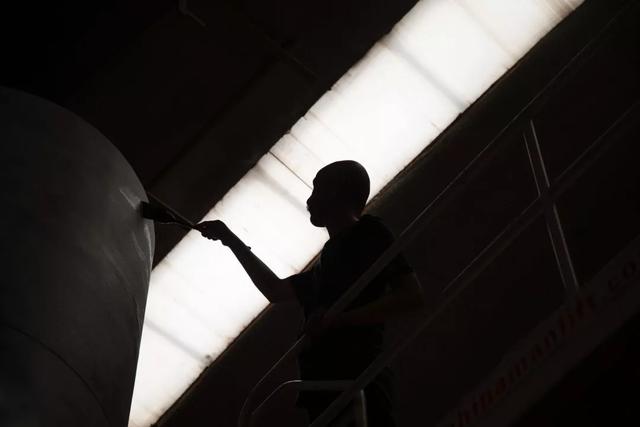
如今,徐龙森开始尝试新的自我突破,而突破,则意味着割裂。“混沌”着的徐龙森,想回到魏晋去和刘伶浮一大白,“混沌”着的徐龙森,尝试更新着山水的精神境界,无论天地透露的是崇高、苍茫、洪荒,还是宇宙开天辟地之前的混沌无象。
Today, Xu Longsen trys to challenge himself to new breakthroughs. Xu Longsen imagined himself having a drink with Liu Ling back to Wei and Jing Dynasty so that he could imagine the original landscapes in the past era. He felt the chaos inside of him and eager to feel otherwise and breakthrough, no matter if it’s from the nobility, boundless distance, and primitive hugeness even the chaos before this universe was created.
无法否认的是,“混沌”着的徐龙森,早已像一艘轻舟,悠然自在,穿过万重高山。
What we cannot deny is, Xu Longsen’s "chaos" is already like a boat, leisurely and comfortably sailing through a million mountains.


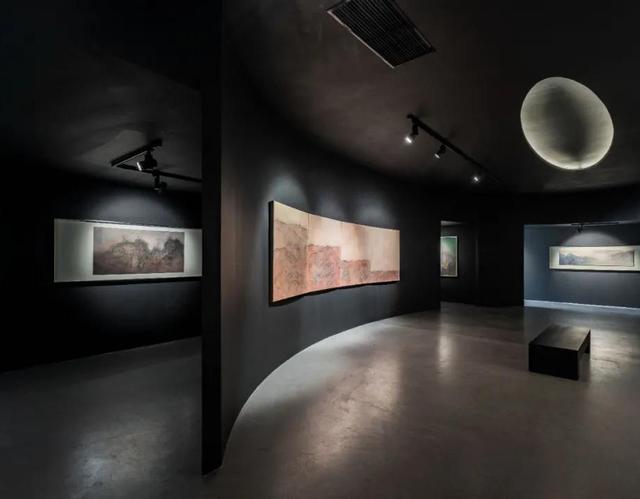



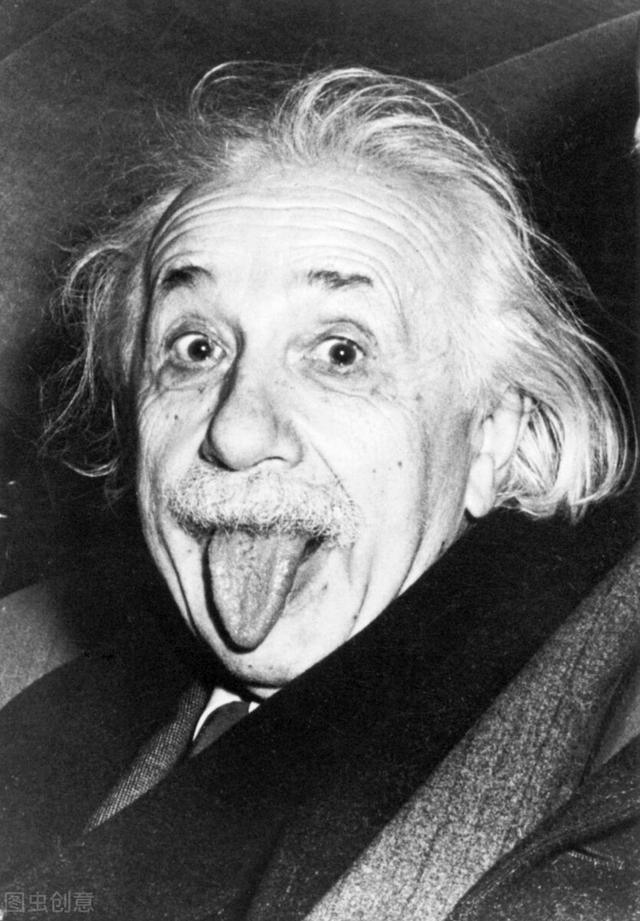
















评论